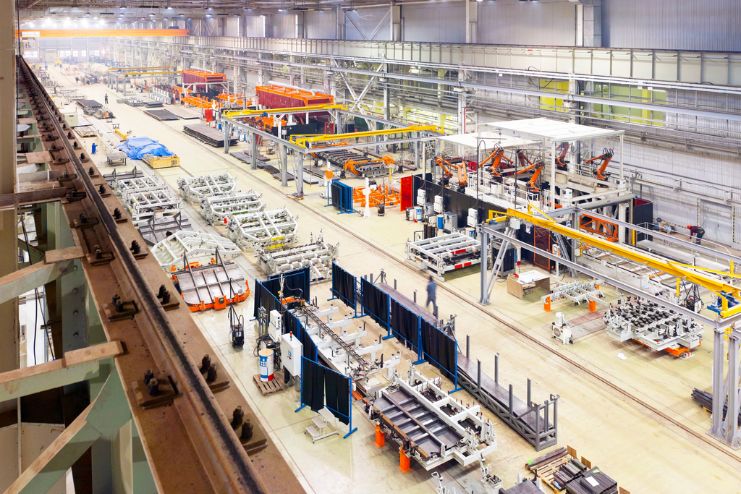Industry 4.0, a term coined in 2011 to describe the integration of digital technologies into manufacturing and industrial processes, refers to the fourth industrial revolution that began in the late 20th century and continues to evolve today.
In the early 2000s, the concept of “smart factories” emerged, which utilised sensors, software, and other digital technologies to optimise manufacturing processes. This concept was followed by machine-to-machine communication, which enabled devices to communicate and work together without human intervention. German companies, research institutes, and the German government originally introduced the Industry 4.0 concept. The aim was to promote the integration of digital technologies into the manufacturing industry to create a more efficient and flexible production process.
In this post, we will cover how Industry 4.0 combined with AI is helping organisations evolve, touching on the following:
- How organisations are currently deploying industry 4.0
- Why AI is an essential part of industry 4.0
- Why computer vision and Industry 4.0 are better together
- How Aicadium can assist in your organisation’s digital transformation
How Industry 4.0 is deployed today
There are many success stories for Industry 4.0 technologies across various industries. A few examples include:
-
Predictive Maintenance in Aviation: Rolls-Royce, the British engine manufacturer, uses sensors and data analytics to monitor the performance of its aircraft engines in real-time. The company uses this data to predict when maintenance is needed and schedule it before a failure occurs, reducing downtime and increasing safety.
-
Smart Manufacturing in Automotive: Bosch, the German automotive parts manufacturer, has implemented smart manufacturing technologies to improve its production processes. The company uses autonomous guided vehicles (AGVs) and collaborative robots to transport materials and perform tasks, improving efficiency and reducing costs.
-
Personalised Medicine in Healthcare: AstraZeneca, the British pharmaceutical company, uses AI and machine learning to analyse large amounts of patient data to develop personalised treatments for cancer patients. The company’s approach has improved patient outcomes and reduced healthcare costs.
In these examples, we see how technology is playing a critical role in helping organisations move efficiently and with precision. Another key takeaway from the examples is how each company achieved different outcomes.
By utilising predictive maintenance, Rolls-Royce was able to maximise safety and minimise downtime. This proactive approach proved beneficial in their operations. Meanwhile, Bosch used process improvement objectives which helped them become more efficient while decreasing costs. And in the case of AstraZeneca, they had a very specific plan in mind to develop personalised treatments for cancer patients, ultimately leading to life-saving treatments that reduced patient costs.
Through the integration of technology with well-defined objectives, these companies have successfully demonstrated how Industry 4.0 can resolve various issues. Is there anything your organisation would like to improve? Starting with the why is a good first step in identifying how to leverage technology.
Why AI is an essential ingredient for success
Key technologies for a successful Industry 4.0 implementation often include some or all of the following: Internet of Things, Artificial Intelligence, Robotics, and Big Data Analytics. AI is the most recent to gain acceptance within the manufacturing and heavy industry sectors. AI is essential for Industry 4.0 for the following reasons:
-
Automation: AI-powered automation can improve efficiency, reduce errors, and save time and resources. For example, AI can help optimise production processes, reduce downtime, improve safety, and streamline supply chains.
-
Predictive Maintenance: AI can enable predictive maintenance by using sensors and data analytics to identify potential problems before they occur. This approach can save money on repairs and reduce downtime.
-
Quality Control: AI can improve quality control by analysing data from sensors and cameras to identify defects and anomalies in real time. Real-time detection can help prevent defects from reaching the end user and reduce product recalls.
-
Personalisation: AI can enable personalised products and services by analysing customer data and preferences, helping companies better understand their customers and create products and services tailored to their needs.
-
Innovation: AI can help companies innovate by enabling them to prototype and test new products and services rapidly. Prototyping can help companies stay ahead of the competition and bring products to market faster.
Overall, AI is an essential component of an Industry 4.0 strategy because it can help companies improve efficiency, reduce costs, and create new opportunities for growth and innovation.
Computer Vision and Industry 4.0
Computer vision is another key technology in Industry 4.0. companies can use computer vision products, such as Aicadium View, to inspect and verify the quality of their products as they move through the production line or to inspect industrial assets, such as aircraft engines. For example, a computer vision system can use cameras and image processing algorithms to detect defects in an asset, such as scratches or dents, and flag them for further inspection or repair. This system allows manufacturers to catch issues early on and prevent defective assets from reaching customers, which can help reduce costs and improve customer satisfaction and safety.
Another example of computer vision in quality control is in the food industry. Companies can use computer vision systems to inspect and sort food products based on their quality, size, and shape. For instance, a computer vision system can analyse the appearance of fruits and vegetables and sort them into categories based on their ripeness, colour, and other factors. This system can help reduce waste, improve product consistency, and enhance food safety by detecting and removing contaminated or spoiled products.
Take the next step
Today, Industry 4.0 is seen as a key driver of economic growth and competitiveness, and many countries and companies worldwide are investing in developing and implementing these technologies. The fourth industrial revolution is expected to continue to evolve and transform the manufacturing industry, with new technologies and applications being developed and implemented over time.
Are you ready to take the next step toward a successful Industry 4.0 strategy? Reach out to Aicadium to explore how AI can fast-track your digital transformation and move your organisation to the next efficiency level.






